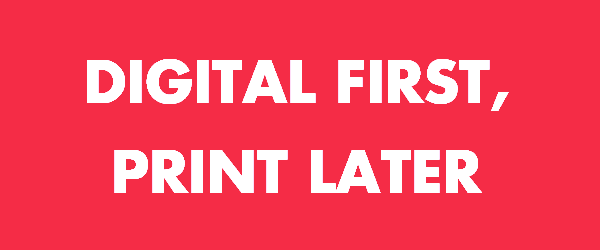Tras el paro de las publicadoras de comics debido a la contingencia sanitaria por el COVID-19, surgió una alternativa bastante novedosa para mantener a flote a la industria del comic comercial: creado por el detallista Stu Colson, ComicHub fue un sistema a través del cual cualquier tienda de comics dentro del Mercado Directo pudiese ofrecer a sus clientes comics de reciente publicación en formato digital, además de un código el cual podría redimirse una vez que la edición impresa estuviese disponible.
Esto representó una solución inmediata y elegante, pero para el gremio detallista fue un rotundo NO. Se trataba de una opción completamente disruptiva que cambiaba a sus modelos de operación, por lo que su implementación quedó detenida de momento.
Dicho impasse nos lleva a reflexiones necesarias acerca de un monolito como lo es el Mercado Directo, que poco a poco sigue incrementando sus grietas y daños estructurales. Renuente al cambio, ya solo nos queda esperar el momento de una evolución forzosa, y sacudidas sociales como las que se viven en 2020 tienen que llevarnos a considerar nuevas formas de actuar, pensar y emprender.
A continuación compartimos un comentario amplio e inteligente del diseñador gráfico Tom Müller, activo desde principios del 2000 y con gran experiencia en el mundo del publishing y el nicho de los comics. Palabras que como un todo nos impulsan a dirigir nuestra mirada hacia el futuro sin importar las consecuencias.
– – – – – – – – – –
Tom Müller
Publicado originalmente via Twitter (@hellomuller) el 4 de abril de 2020.
A few thoughts on the ComicHub stop-gap fix for the comic industry that was over before it began (a thread):
At face value, I really liked the digital-first aspect of this idea by giving audiences access to content now; with a print version coming later.
It could have worked (I base this on all the articles I’ve read on it); but you just don’t change a back room store ordering system into a digital distribution platform overnight. Maybe they had that service ready; but still—it would be a massive pivot in a very short time.
Also, announcing a service that radically changes how you buy comics without having at least the top 4 publishers locked in place is an own goal. Just look at any digital content service that is successful: they all have 100% of their content ready to go at announcement.
The announcement itself had too many gaps explaining the service; which obviously didn’t sit well with a lot of retailers; and this fix hinged on pretty much at least 90% buy-in from retailers. But that’s not the main problem as I see it.
IF this had worked and gone live; it would have kickstarted a massive change in the way comics are distributed; giving digital-first a real foothold for the first time; because people have no other option. And if this stop gap lasts long enough you change customer behaviour.
Not to mention giving services like Amazon/ComiXology the go-ahead to swoop in and gobble up all the business—or for publishers themselves to decide digital is the way forward, this time with utter conviction; because the sales are suddenly there.
This is great for a global audience, because suddenly you have much more access to product; and the print vs. digital argument has been weakened, because it’s digital or nothing for the time being. But it is going to wreak havoc on the direct market.
“People saying they “can’t do” digital comics are the same ones with subscriptions to Netflix, Spotify, Steam, Apple, Amazon Prime, Hulu, YouTube, PlayStation Network, etc. Your media collections are now playlists. You don’t always need a physical artefact to enjoy them.”
— Tom Müller.
Stores that depend on New Comic Book Day and Marvel & DC will suffer the most. Stores that are modelled like book stores offering more product and an experience will fare better (see also the way the music and film industry has reshaped the shop landscape).
Folks lament the demise of their local rental shops or record shops that disappeared (I do); but the ones that are still around are thriving. This is the reality of digital-first. The customer wins; the publishers win. Stores—not all of them will come out of this healthy.
And all this doesn’t even take into account the weeks and months that stores currently have to survive without doing business as usual (and this is not just a comic book industry problem).
That’s why I think the backlash against this fix was so strong, because a lot of stores saw this potential scenario play out. If we’re stuck in this situation for too long the pressure to keep businesses afloat will force the hands of publishers to release content digitally to get revenue going again; bypassing a decades old infrastructure. And it doesn’t take much to push your consumers over that line if there’s no alternative. But the comics industry, more so than any other is beholden to tradition and “collectability”. And when you take those two things out the equation you’d be, as an industry, much stronger to push ahead and change the way you get your product to your audience.
Print still has a place; and making that aspect something more tangible as objects you can build something where digital & print can be regarded as equal ways of enjoying comics. I think this year is going to be really painful for comics; but I hope it will force a change for the better for the industry to push us into the future.

